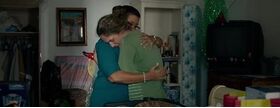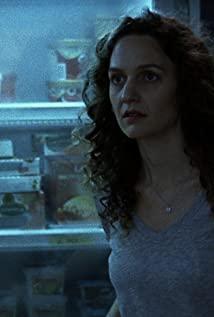"Second Mom" is a Brazilian film that tells the story of the civilian mother Val far away from her hometown and daughter, and came to work as a nanny in the home of a wealthy man in São Paulo State. The story is very plain, and on the surface it presents the problems of differences between rich and poor, class differences, and parent-child conflicts, but the characters' mental activities are particularly well performed, which can slowly reveal the deeper connotation of the story. Therefore, the expression of this film is layered, with various light and dark contrasts, various high and low contrasts. I like the beauty of intertwined light and dark, and the difference of heights and lows. I like the feeling of aftertaste after watching the movie.
The film begins to spread out all kinds of brightness: Brazil's particularly bright and dazzling sun, lively music, the busy but fulfilling life of Nanny Val, and the wealthy and superior status of the host Barbara's family. The state of Sao Paulo provided the wealth, status, and prestige that a middle-class family should have, first injecting bright life into this story. With the arrival of Jessica, his daughter, who hadn't seen Val in ten years, the dark spots under the light and shadow of this family slowly emerged.
Nanny Val is Jessica's biological mother, but she did not accompany Jessica's growth. Because of the breakdown of the marriage and also to earn a living, she and Jessica were separated for ten years and missed an important period of her growth. Jessica grew up with relatives. For Jessica, Val is just a nominal mother, that is, the "second mother". The alienation of family affection caused awkwardness in getting along with each other, and the irreconcilable differences in concepts between each other caused the outbreak of contradictions. Over the past ten years, Val has been able to play a role as a nanny. She even had an illusion: she feels that she can almost become an inseparable part of the Barbara family, follow the traditional rules of master and servant, and work hard. In this way, the host’s kindness can be obtained. In the role of mother, she felt unfamiliar and clumsy. Although in her heart, her love for her daughter is deep, the channel that connects the love between the two is no longer open, so when she is in the same room, she often shows unconcealed loneliness and helplessness. For the description of this complex and contradictory emotions, I was impressed by a scene: the scene of the first meeting between Val and his daughter at the airport ten years after they were separated. When reuniting after a long absence, the excitement and surprise that Val showed was so disproportionate to the discomfort and embarrassment that Jessica showed.
Barbara is Fabino's biological mother. Despite the wealth of economic conditions, in order to pursue career success and a wonderful life, Barbara was handed over to the nanny Val to take care of her since childhood, so it is the nanny who really accompanies her son to grow up. For Fabino, Barbara is only a nominal mother, and the nanny is the "first mother" who cares about and loves him. All his thoughts can be exposed to the nanny, all weaknesses can be placed in the arms of the nanny, and getting along with his mother is full of defense and resistance, as if his mother is just a "second mother." Barbara gradually realized this, especially when her son showed carelessness when she was injured in an accident, the helplessness and sadness in her heart was fully revealed in the low soundtrack of the film. But the missed time will not come back, and the alienated feelings are hard to repair. In addition, the seemingly stable marriage is actually crumbling inside. Her iron maiden style is difficult to achieve a deep fit with a scholar-like husband. Therefore, when her husband meets a student like Jessica who is willing to listen and look up to him, emotionally Start wandering. One of the episodes is that Barbara was interviewed by the media. The content was about the definition of personal style. She replied confidently: "Style cannot be defined. I believe that style is to be yourself." The success of her career gave her confidence and affirmation. She is praised by magazines as a leading female and fashionable person. Obviously, as a professional woman, Barbara is successful. But as a mother and wife, only a weak shell remains under the appearance of toughness.
At the end of the film, another mother is brought out: Jessica. This girl who came to São Paulo State to join her mother is just a high school student who is here to take the college entrance examination. She is smart, stubborn, kind and straightforward, and expresses her dissatisfaction with her mother's persistent class concept. As a new generation of women, she has the courage and belief to break through the conventions. However, since mother Val found a picture of a little boy, it led to the fact that she was an unmarried mother. The story ends, and there is no more explanation for this. The director’s blank space in this paragraph makes us unable to know what she has experienced, nor how to spend her childhood in that period of ten years under the fence. And boyhood. I only know that when she needed her most, her mother was always absent. Fortunately, she didn't give up on this, but instead strived to make progress and worked hard to prepare for the exam to enter a first-class university. She should be very clear that she must work hard to get a better life, even in the future, for this, she must be separated from her son.
In fact, everyone's life in the play has its brightness above the surface and its shadow that sinks in the bottom of my heart.
By comparing these mothers with each other, you will find that the film tries to ask a question from the perspective of women: If some women are on the way to realize their personal value, if they have to lose the time of their parents and children as the price, then this kind of How much value is left to realize? And more women have to be separated from the next generation just to make a living. How to make up for the lost love?
Not everyone will realize this regrettable price, and even if they do, they may not have the confidence to make up for it. Although Barbara realizes that the relationship between her son and the nanny is closer than that with her, she did not choose to repair it. Instead, relying on her inherent self-confidence, she sent her son to study abroad. She is confident that money can create every opportunity to succeed, which seems to include the close relationship between mother and child.
Fortunately, in the last few minutes of the film, on a sunny afternoon in Brazil, Val finally quit his job as a live-in nanny and moved to live with his daughter. He also proposed to her daughter to take care of her grandson, in addition to making up for the lack of her daughter. His maternal love also tried hard to prevent the trauma of separation between mother and child from repeating. As a result, the ice between the two began to melt. When they return to their positions: a mother who is willing (can) to accompany, a child who is loved and understood, the energy of love flows beautifully again. Everything is so natural, peaceful, and vibrant.
View more about The Second Mother reviews









